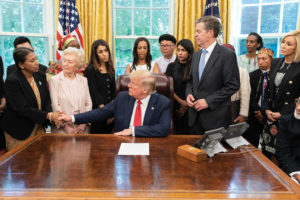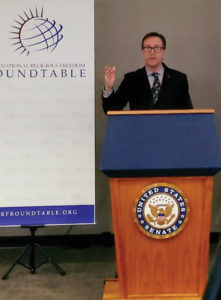A Humanist Take on the State Department’s Ministerial to Advance Religious Freedom Championing survivors, challenging the state
 President Trump met with survivors of religious persecution from seventeen countries on Wednesday, July 17, 2019, in the Oval Office of the White House. (Official White House Photo by Shealah Craighead)
President Trump met with survivors of religious persecution from seventeen countries on Wednesday, July 17, 2019, in the Oval Office of the White House. (Official White House Photo by Shealah Craighead) This summer I participated in the US State Department’s Ministerial to Advance Religious Freedom on behalf of the American Humanist Association. The event, held July 16-18 in Washington, DC, was led by Ambassador-at-Large for International Religious Freedom Sam Brownback and brought together foreign delegations, State Department actors, and civil society groups to focus on stopping religious persecution around the globe. Speeches from political heavy hitters, like Speaker of the House Nancy Pelosi (D-CA) and Secretary of State Mike Pompeo, and panel discussions on foreign aid and teaching tolerance packed the schedule.
The three-day event was punctuated by presentations from survivors of religious persecution. At first, watching these presentations felt voyeuristic. What good could possibly come from someone being asked to lean into a microphone and share their deepest trauma with a thousand strangers? It felt like a parade of victimization, especially since there was little people in the room could do to provide relief other than continuing to apply pressure on the perpetrating states.
However, the courage demonstrated by each speaker, one after the other, was beyond heroic. It was contagious. People like Jeffrey Myers of Tree of Life Synagogue in Pittsburgh, Pennsylvania, Nobel Peace Prize recipient Nadia Murad, humanist activist Bonya Ahmed, and Tibetan Buddhist Nyima Lhamo drew more courage into the room than I thought people had the capacity for. They and others brought that same courage to a decidedly awkward meeting with President Trump in the Oval Office on July 17.

AHA Executive Director Roy Speckhardt discusses humanism and religious liberty at the Ministerial to Advance Religious Freedom.
But their courage also gave me pause. We should neither demand nor expect individuals to carry these torches for us—they are too heavy and burn too hot. Instead, civil societies and governments must take responsibility. Where is their courage? It isn’t absent for want of warning. These stories tell us that genocide is more predictable than one might think. Organizations have built early warning systems that keep close tabs on risk factors, yet we either don’t have the tools or the will to intervene before blood is spilt. Moreover, we must have the courage to apply that same scrutiny to our own climate. Government officials who pointed to Uighurs detained in China who “couldn’t even lay down” because the “camps were so crowded” didn’t direct that same disdain to practices on our own soil.
To be taken seriously on an international stage, we need those working in our government to have the courage to publicly acknowledge that our president’s choice to tell members of Congress to go back to their “dirty countries” is not only antithetical to the very goals of the ministerial, but also destroys any progress made. This duplicity was not lost on participants.
We also need those working in our government to acknowledge that attempting to put a blanket ban on asylum seekers at the southern border is not what makes America great, that “detention facility” has become synonymous with “internment camp,” and that the white supremacy that allowed multiple American genocides thrives today.
There is no question that the State Department takes international religious freedom seriously, but their responsibility to be good stewards of this work cannot be taken lightly and their efforts shouldn’t stand alone in our government. And certainly the administration shouldn’t be making it harder by making a mockery of the State Department’s efforts with racist tweets. We’d all be doing much better if we listened carefully to the survivors who spoke, channeled even an ounce of their courage, and resourced our rhetoric. Secretary Pompeo spoke the truth when he told the ministerial audience that
Religious freedom isn’t just a Christian concern, a Jewish concern, a Muslim concern, a Buddhist concern, a Hindu concern, or a humanist concern. It’s all of our concern; it is everyone’s concern.
Let’s all now have the courage to move those concerns into action so that perhaps the survivors who spoke will have the impact they hoped for.
